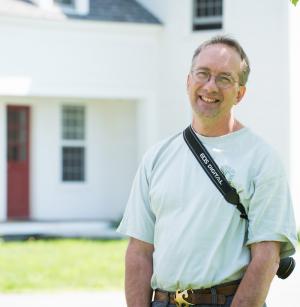Spring 2018
Editor’s Note
 “Functioning ecosystems are the base upon which the entire human experience is built,” says Willson Gaul ’10, who is in a doctoral program in ecological modeling at University College Dublin. “I find it very hopeful that the Marlboro community recognizes the importance of maintaining minimally-disturbed ecosystems in the landscape around us, and has designated a place for ecosystem processes to develop in their own way.” Willson is talking about Marlboro’s new ecological reserve, established by the trustees in November, and he is one of several community members who offer testimonials as a part of Jenny Ramstetter’s article on the reserve.
“Functioning ecosystems are the base upon which the entire human experience is built,” says Willson Gaul ’10, who is in a doctoral program in ecological modeling at University College Dublin. “I find it very hopeful that the Marlboro community recognizes the importance of maintaining minimally-disturbed ecosystems in the landscape around us, and has designated a place for ecosystem processes to develop in their own way.” Willson is talking about Marlboro’s new ecological reserve, established by the trustees in November, and he is one of several community members who offer testimonials as a part of Jenny Ramstetter’s article on the reserve.
Deciding on how to conserve ecological resources—and who benefits—is never easy, as recognized in Matt McIntosh’s personal narrative from Chile’s Patagonia. But we are fortunate at Marlboro College to have an engaged community and governance structure that allows voices to be heard, concerns to be raised, and progress to be made in the interest of the common good. If you have any doubt of this, I encourage you to see the recent video on Town Meeting highlighted on the inside front cover of this issue of Potash Hill.
We are also fortunate at Marlboro to offer students a breadth of experience that stands to make them conscientious community members, as underscored by the new Center for Experiential Learning and Global Engagement. New faculty member Bronwen Tate’s pop-up class on daily practices exemplifies the responsiveness of the curriculum to the emerging interests of students. Even the ecological reserve itself has been the subject of several classes and Plans of Concentration in recent years, in response to student concern.
As always, this issue of Potash Hill contains a veritable ecosystem of exciting events, news from faculty, and of course class notes. Can you see the forest for the trees? I welcome your news, your views, your reactions to this issue, at pjohansson@marlboro.edu.
—Philip Johansson, editor
